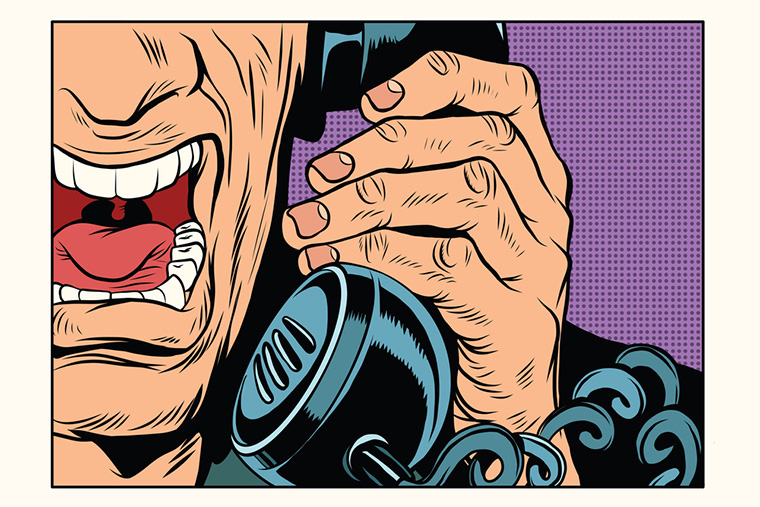
Anger, the faux, feigned kind, has been a tool in negotiations for generations. The idea that pretending to be angry can coerce the counterpart into conceding to your terms. Those thinking about using such a tool, though, need to realize the real costs and risks involved.
A new paper, authored by Washington University in St. Louis faculty and alumni from Olin Business School, reports findings from five different studies of subjects in a negotiation agreement. The takeaway: inorganic anger generally leaves parties of both parts feeling guilty, distrusted and needing to make amends afterward.
In short, “You’re likely going to pay a real price for the anger you express,” said Bill Bottom, the Joyce and Howard Wood Distinguished Professor of Organizational Behavior at Olin and senior author on the paper published online March 18 by the Journal of Behavioral Decision Making.
Bottom, who studies social and psychological aspects of negotiation, noticed how many previous studies and the business media reporting on this work have focused on “overgeneralizing a very narrow set of findings.” Similar accounts published in top-notch media outlets baldly made statements akin to, “it pays to be angry.”
Not quite, Bottom said. “When you convince somebody to act like this, whether it’s with their boss or trying to buy a car or trying to sell a car, we’re doing a disservice if we’re making such grandiose claims,” Bottom said.
His interest in studying this tactic goes way back to a recollection from a member of the late President Richard Nixon’s inner circle, H.R. Haldeman. Nixon boasted to Haldeman that he would end the Vietnam War by using his “Madman Theory” — if the then-Soviet Union’s Leonid Brezhnev and North Vietnam’s Ho Chi Minh believed the man with his finger on the nuclear button was capable of an emotional explosion, they would quickly concede to American terms. Some pundits have suggested that President Donald Trump, a Nixon fan, mimics the theory in international relations.
“There actually isn’t much evidence that this is a successful stratagem,” Bottom said. “It certainly didn’t work for Nixon despite American military power.”
The anger strategy is where their research comes into play. Five different study approaches testing feigned anger were used by Bottom in his collaboration with lead author Rachel Campagna of the University of New Hampshire and co-author Alexandra Mislin of American University — both of whom earned PhDs at Washington University and worked with Bottom on a previous paper published in 2016 by the Journal of Applied Psychology.
In that study, they paid some negotiators a bonus to express anger during their negotiations. They found that the anger that participants had initially faked eventually turned into genuine feelings of anger because of the way their counterparts reacted to them. When it came time to implement the deal, these counterparts more often shirked or reneged outright.
A few of the participants who feigned anger admitted to guilty feelings afterward, leading the researchers to design these new studies to examine how often these guilty feelings really emerge.
The five new studies numbered more than 600 participants. In one design, Campagna and Mislin persuaded participants to come back the next day to implement the terms of the deal they had negotiated the previous day. While anger had dissipated by the next day, it had frequently been replaced by feelings of guilt over the way these people had treated their counterpart during the negotiation.
These feelings and the trust issues led the participants to find ways to atone for their actions when implementing the agreement. Given discretion over how to split up a new pool of money, negotiators who had expressed anger the previous day awarded nearly 20 percent more of their entire $50 allotment, or $9.92 more on average, to the anger-recipient counterpart ($27.70) than to the unaffected counterpart ($17.78).
In another of the studies, examining the lingering after-effects, the person feigning anger later awarded 16.6 percent more of his or her $50 allotment to a negotiation counterpart ($30.41) than did people who acted as happy negotiators ($22.11) or others who tried to remain neutral in talks ($21.13).
The findings convinced the researchers that using anger as a negotiating tactic is a lot more likely to increase guilt and distrust than it is to work in coercing concessions from the counterpart. They learned that guilt in particular triggered post-negotiation compensations, atonement and efforts at repairing the damage.
“Implementing the agreement is key in negotiations,” Bottom said. “If you’ve behaved this way with anger, you’ve destroyed a lot of trust. On your end, you realize this isn’t good for the long run. So if you feel guilt, you may try to correct the damage.
“What we found is, negotiators are willing to compensate the people on the receiving end and wind up paying more than the negotiators who never expressed anger at all,” Bottom said.
Anger introduced into the negotiation process as a mechanism sometimes ended in the other party reneging on the contract or shirking agreed-upon responsibilities, as often as 30 percent of the time, Bottom said.
But the researchers emphasized: This involves anger used as a tactic, not emotions roiled by hard-fought negotiations. “When genuine anger emerges organically, I think it’s a very different process and has very different implications,” Bottom said.
This study provides context that inorganic anger comes with later costs.
“We don’t say: stop being angry,” Bottom said. “What we are saying is: It’s not a useful tool to pull out as a means to coerce somebody to do something they weren’t going to do otherwise.”
By Chuck Finder
This content was originally posted by the Washington University in St. Louis.